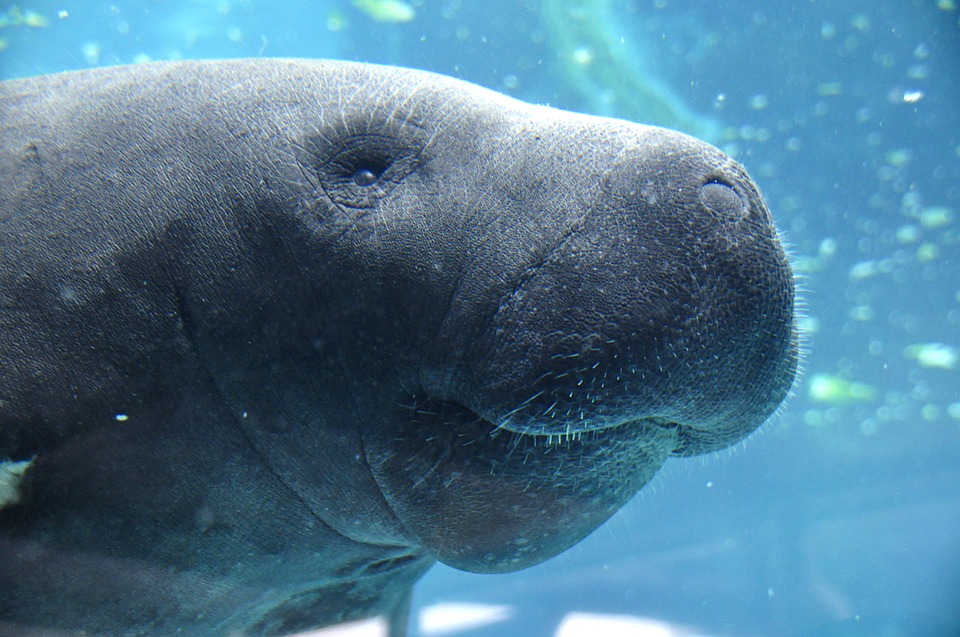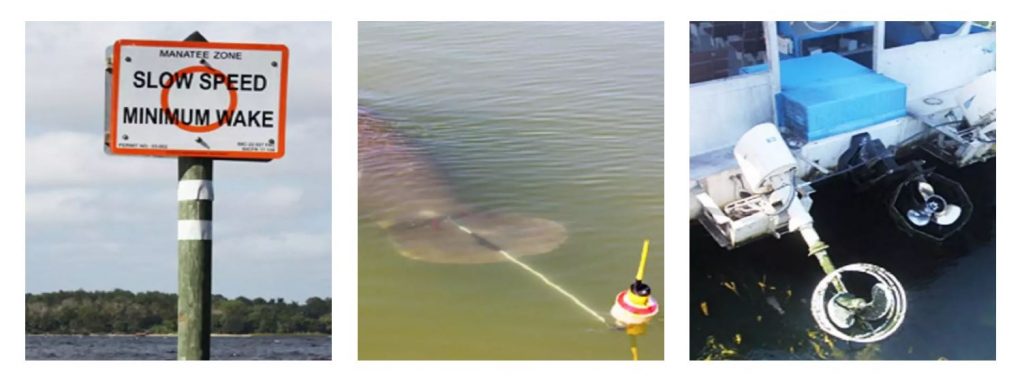Did you know that manatees are Florida’s official state marine mammal? Every year, Manatee Appreciation Day falls on the fourth Wednesday of March. It’s a day dedicated to learning about, appreciating, and helping these gentle giants. Manatees continue to face many threats ranging from watercraft collisions to habitat destruction.

Fun Fact: November is Manatee Awareness Month
In honor of Manatee Appreciation Day, we have collected some tips and guidelines from leading resources, like Save the Manatee and the Florida Fish and Wildlife Conservation Commission. By sharing this information, we hope to help visitors and residents alike celebrate and protect Florida’s manatee populations!
If there is a wildlife emergency, please use the following information:
Report injured, orphaned, entangled, distressed or dead manatees to the FWC. Call the Wildlife Alert Hotline at 888-404-3922.
Early reporting sets the rescue team in motion so that the animal(s) can be saved.
What Should You Do When You See a Manatee?
Manatees are found in many of Florida’s waterways and can be difficult to see, especially when you travel in a boat on the water. You may see a swirl on the surface caused by the manatee when it dives; see an animal’s back, snout, tail, or flipper break the surface of the water; or you may only hear the manatee when it surfaces to breathe (as shown here). In all of these instances, keeping your distance and passive observation are the best ways to view manatees. (For more boater related information please review “A boater’s guide to living with Florida Manatees.”)
What are the Guidelines for Viewing Manatees?
- Look, but don’t touch manatees. Also, don’t feed manatees or give them water. If manatees become accustomed to being around people, they can alter their behavior in the wild, perhaps causing them to lose their natural fear of boats and humans, which may make them more susceptible to harm.
- Do not pursue or chase a manatee if you see one while you are swimming, snorkeling, diving, paddling or operating a boat.
- Never poke, prod or stab a manatee with your hands, feet or any object.
- If a manatee avoids you, do not chase the animal for a closer view.
- Give manatees space to move. Avoid isolating or singling out an individual manatee from its group and do not separate a cow and her calf.
- Keep hands and objects to yourself. Don’t attempt to snag, hook, hold, grab, pinch, hit or ride a manatee.
- Avoid excessive noise and splashing if a manatee appears nearby. The manatee may be resting and may surface without being aware of your presence. Noise and activity may startle the animal awake, which may put it in harm’s way if it is frightened and leaves the area.
- If the site you visit allows in-water activities near manatees, use snorkel gear and float at the surface of the water to passively observe manatees. The sound of bubbles from SCUBA gear or other devices may cause manatees to leave the area.
How Can I help Protect Manatees?

Images Courtesy Florida Fish and Wildlife Conservation Commission
- Show your support for manatees on your vehicles or vessels. Continued support from thousands of people willing to purchase Save the Manatee specialty license plates or donate funds to the manatee program has allowed the state to develop and administer what was, and is needed for management and research programs that protect and conserve Florida’s manatees for future generations to see and enjoy.
- Be active in your community and help keep manatee habitats clean. One of the best ways to help manatees and other wildlife survive is to participate with shoreline, beach, park or roadside cleanup events in your area. If you are enjoying a day in the outdoors you are encouraged to pick up litter or discarded fishing line and dispose of it properly.
- Volunteer your time to educate others and help manatees. Share this link with paddlers you know to encourage wildlife friendly observation in Florida.
- Check with local environmental organizations. See if you can volunteer or conduct a community service project that would benefit manatee conservation.
- Recycle your monofilament fishing line in designated bins near docks, ramps or in tackle shops. Get your civic group to adopt or monitor a recycling bin in your area.
- Be aware and be prepared on the waterways. Obey ALL posted waterway signs and use FWC manatee and boating safety zones maps to plan your trips.
- Look out for (but do not touch or remove) GPS/telemetry tag units on manatees. These animals are monitored for research purposes or for health reasons with activities conducted under a federal research permit. The tags do not cause harm and are made to breakaway if they become entangled.
- Avoid traveling in seagrass or other shallow areas when possible. Manatees may be feeding or resting. Look out for manatees and give them space.
- Use propeller (prop) guards appropriately if you have a guard on your vessel – Reduce your speed while using a prop guard to give manatees time to get out of your way. A slower speed also reduces the chance that the guard will harm a manatee if it is struck by the guard. (Note: Search the Internet to see the variety of prop guard designs available. The image above is an example of what a prop guard may look like—image compliments of Edward Ball Wakulla Spring State Park, Florida Park Service
Protection by Law
The manatee is protected under federal law by the Marine Mammal Protection Act of 1972 and by the Endangered Species Act of 1973, which makes it illegal to harass, hunt, capture or kill any marine mammal. The manatee is also protected by the Florida Manatee Sanctuary Act of 1978, which states: “It is unlawful for any person, at any time, intentionally or negligently, to annoy, molest, harass, or disturb any manatee.”
Anyone convicted of violating this state law faces a possible maximum fine of $500 and/or imprisonment for up to 60 days. Conviction on the federal level is punishable by fine of up to $50,000 and/or one year in prison. The State of Florida can pursue prosecution under federal law in circumstances of extreme harassment, resulting in the death or injury of a manatee. For more information: Guidelines for Protecting Florida Manatees
TO REPORT AN INJURED, DEAD, HARASSED, OR ORPHANED MANATEE
Call the Wildlife Alert Hotline 888-404-FWCC(3922). Cell phone users may call *FWC or #FWC.






